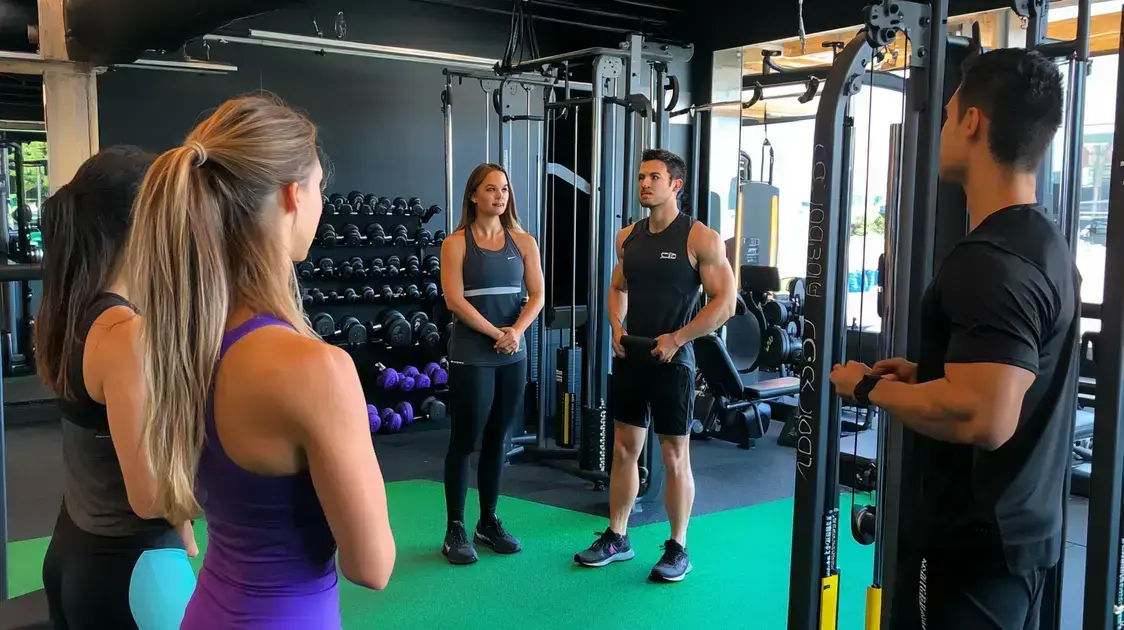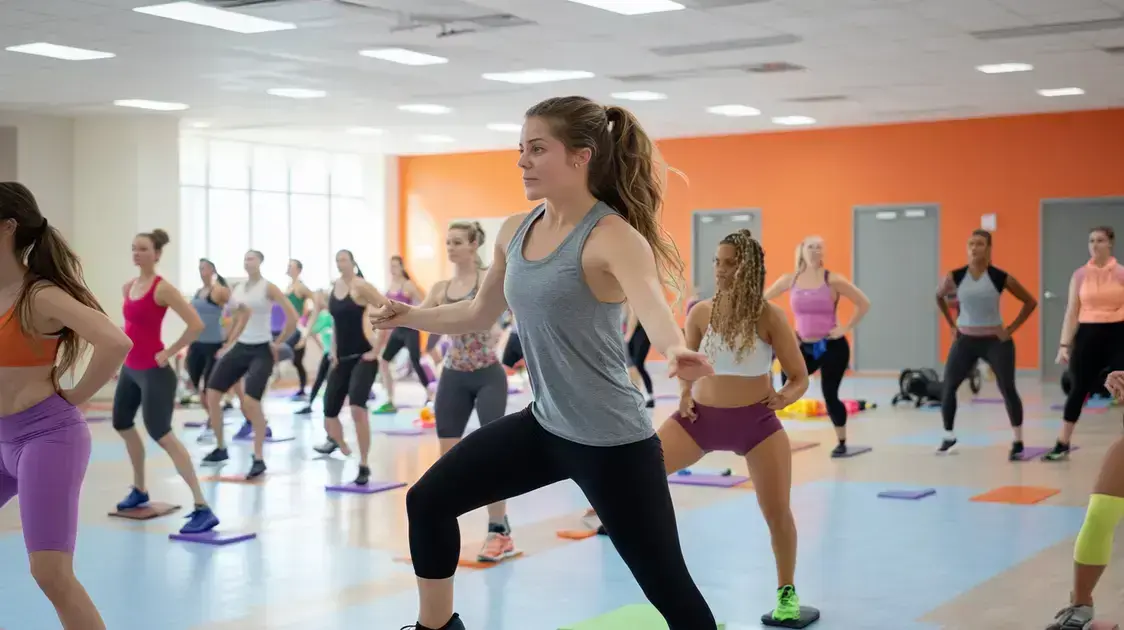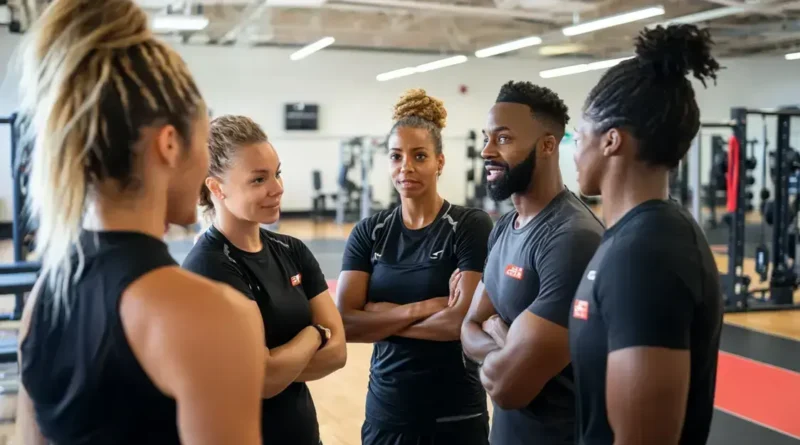What Do Fitness and Wellness Coordinators Do? A Complete Guide
What Do Fitness and Wellness Coordinators Do? These professionals play a key role in improving health and fitness by creating personalized fitness plans, offering coaching, and running wellness programs.
Their tasks include assessing fitness levels, leading group classes, and providing basic nutrition advice. By customizing programs, they ensure clients stay motivated and on track to achieve their personal goals, ultimately promoting a healthier lifestyle.
Fitness and wellness coordinators are essential in today’s health-conscious world. Keep reading to explore the core responsibilities and skills needed for this impactful career!
Understanding Fitness and Wellness Coordinators
Understanding Fitness and Wellness Coordinators involves recognizing their vital role in promoting health and fitness within communities. They are professionals dedicated to helping individuals and groups enhance their physical well-being through various fitness programs and wellness initiatives.
Main Functions include developing fitness plans, conducting health assessments, and providing personalized coaching to individuals. They also work to create engaging wellness programs that encourage participation and foster a healthy lifestyle.
Importance of Their Role cannot be overstated; fitness and wellness coordinators help individuals set and achieve their fitness goals, which can lead to improved quality of life. They often serve as motivational figures, guiding clients through challenges and celebrating successes.
Work Settings for these professionals can vary. They are found in gyms, community centers, corporate wellness programs, and healthcare facilities. Each setting provides unique opportunities to connect with different populations and promote health in diverse environments.
This role is essential in combating health issues such as obesity and stress. By tailoring programs to meet specific needs, fitness and wellness coordinators can address a wide range of health concerns, making their expertise invaluable in today’s health-conscious world.
Key Responsibilities of Fitness Coordinators

Key Responsibilities of Fitness Coordinators encompass a variety of tasks that ensure clients meet their health and fitness goals. One of their primary duties is to assess clients’ fitness levels. This involves evaluating physical health through tests and discussions tailored to each individual’s needs.
Designing Personalized Fitness Plans is another crucial responsibility. Fitness coordinators craft unique workout routines and health strategies for each client based on assessment outcomes. These plans are tailored to help individuals achieve their specific goals, whether it be weight loss, muscle gain, or general fitness.
Conducting Group Fitness Classes is often part of their role. Many fitness coordinators lead classes in settings like gyms or community centers, providing motivation and guidance to participants.
Monitoring Progress is essential for ensuring clients stay on track. Fitness coordinators regularly check in with clients, measure progress, and adjust plans as needed to keep them motivated and engaged.
Providing Nutritional Guidance is another aspect of their job. While they may not be registered dietitians, fitness coordinators offer basic nutritional advice to support clients’ fitness journeys, emphasizing the link between diet and physical activity.
Organizing Wellness Activities is vital to promote overall health. This may include workshops, seminars, or challenges that encourage community involvement and healthier lifestyle choices.
Collaborating with Health Professionals is also important. They often work alongside physical therapists, dietitians, and other professionals to create comprehensive wellness programs that cater to individual needs.
Staying Up-to-Date with fitness trends and research is essential for effectiveness. Continuous education ensures that fitness coordinators offer the best guidance and practices to their clients.
Essential Skills for Wellness Professionals
Essential Skills for Wellness Professionals are crucial for effectively guiding clients on their health journeys. One of the most important skills is communication. Wellness professionals must be able to explain concepts clearly and motivate clients. Good communication helps build trust and understanding.
Empathy is another essential quality. A wellness coordinator should understand what clients feel and experience. This allows them to provide support tailored to individual needs.
Knowledge of Health and Nutrition is vital for advising clients accurately. They should stay informed about the latest research in fitness and wellness to give relevant suggestions that promote healthy living.
Organizational Skills are also important. Wellness professionals often handle many clients, so they need to maintain good records, schedules, and program plans. Being organized helps them manage their time and responsibilities effectively.
Problem-Solving Skills are necessary for overcoming challenges that clients may face. A wellness professional must be able to think critically and provide solutions tailored to each individual’s circumstances.
Leadership Skills matter as well. Coordinators must inspire clients to take control of their health. This includes leading group classes, organizing events, and creating a positive environment for fitness activities.
Adaptability is an essential trait for wellness professionals. They need to adjust plans and strategies as clients’ needs change or if new health trends emerge.
Lastly, a commitment to continuous learning is essential. The field of wellness is always evolving, and staying updated helps professionals offer the best guidance possible.
Education and Certification Requirements

Education and Certification Requirements for fitness and wellness coordinators are important for ensuring competence and professionalism in the field. Typically, a high school diploma is the minimum requirement. However, many employers prefer candidates with a bachelor’s degree in fields like exercise science, kinesiology, or health promotion.
In addition to formal education, obtaining certifications is essential for advancing a career in fitness and wellness. Certifications can provide proof of expertise and dedication to the profession.
Some of the most recognized certifications come from organizations such as:
- American College of Sports Medicine (ACSM) – Offers certifications that focus on fitness and clinical exercise science.
- National Academy of Sports Medicine (NASM) – Known for its Certified Personal Trainer program.
- American Council on Exercise (ACE) – Provides a range of certifications in personal training, group fitness, and health coaching.
- International Sports Sciences Association (ISSA) – Offers personal training and wellness coach certifications.
CPR and First Aid Certification is often required or highly recommended for fitness coordinators. This ensures that they can respond effectively to medical emergencies during workouts.
Continuing education is also important. Many certifications require professionals to renew their credentials by completing a certain number of continuing education units (CEUs) every few years. This helps them stay updated on the latest trends and best practices in the fitness and wellness industry.
How to Become a Fitness Coordinator
How to Become a Fitness Coordinator involves several important steps that can pave the way for a successful career in health and wellness. First, you should pursue a relevant education. A high school diploma is the minimum requirement, but many employers prefer candidates with a bachelor’s degree in fields like exercise science, health promotion, or kinesiology.
Next, obtaining certifications is crucial. Consider earning certifications from recognized organizations such as the American Council on Exercise (ACE) or the National Academy of Sports Medicine (NASM). These certifications show your expertise and commitment to the fitness profession.
Once you have your educational background and certifications, it’s time to gain practical experience. You can do this through internships at gyms, wellness centers, or community programs. Hands-on experience helps you develop skills and understand the day-to-day responsibilities of a fitness coordinator.
Networking is also beneficial when pursuing a career. Attend industry conferences, join fitness organizations, and connect with professionals in the field. Networking can help you discover job opportunities and gain insights from experienced coordinators.
Additionally, you should continuously improve your knowledge and skills. Stay updated on emerging trends in fitness and wellness. Participating in workshops and further certifications can enhance your abilities and make you more marketable to employers.
Finally, when you feel confident in your skills, begin applying for positions. Tailor your resume to highlight your education, certifications, and relevant experience. Prepare for interviews by knowing the key elements that employers look for in a fitness coordinator.
Work Environment of Wellness Coordinators

Work Environment of Wellness Coordinators can vary greatly depending on their specific job roles and settings. Generally, wellness coordinators work in facilities that promote health and fitness, such as gyms, community centers, and corporate wellness programs.
Many wellness coordinators are found in fitness centers, where they oversee fitness classes, lead training sessions, and design exercise programs. These environments are vibrant and active, filled with people engaging in various physical activities.
Some wellness coordinators may work in corporate settings. In this case, they develop wellness programs aimed at improving employee health, reducing stress, and enhancing productivity. They might conduct workshops or fitness classes in a specially designated area within the workplace.
Another common work environment includes community health organizations. Here, wellness coordinators often engage with the public, promoting health initiatives and providing resources to help individuals achieve their wellness goals.
In healthcare facilities, wellness coordinators may collaborate with other health professionals. They help design programs for patients to promote recovery and overall health, often working closely with physical therapists and dietitians.
The work hours can vary from early mornings to evenings, especially in gym settings where classes are scheduled outside of regular office hours. Flexibility is often necessary to accommodate clients’ needs.
Additionally, wellness coordinators need strong interpersonal skills as they interact with diverse groups of individuals. They must be ready to adapt their approach based on the specific needs of the people they serve.
FAQ – Frequently Asked Questions about Fitness and Wellness Coordinators
What do fitness and wellness coordinators do?
Fitness and wellness coordinators design and implement fitness programs, provide personal training, guide clients on health-related matters, and promote overall well-being.
What education do you need to become a fitness coordinator?
A high school diploma is the minimum requirement, but many positions prefer a bachelor’s degree in exercise science, health promotion, or a related field.
What skills are essential for wellness professionals?
Essential skills include communication, empathy, organizational abilities, problem-solving, leadership, adaptability, and knowledge of health and nutrition.
What certifications can help improve my career as a fitness coordinator?
Certifications from organizations like the American Council on Exercise (ACE) or the National Academy of Sports Medicine (NASM) are valuable for career advancement.
What are the common challenges faced by wellness coordinators?
Challenges include client motivation, diverse client needs, time management, securing resources, and staying updated on industry trends.
What are the future opportunities in fitness and wellness careers?
Future opportunities include roles in corporate wellness programs, online coaching, and increasing focus on preventative health and mental wellness.
